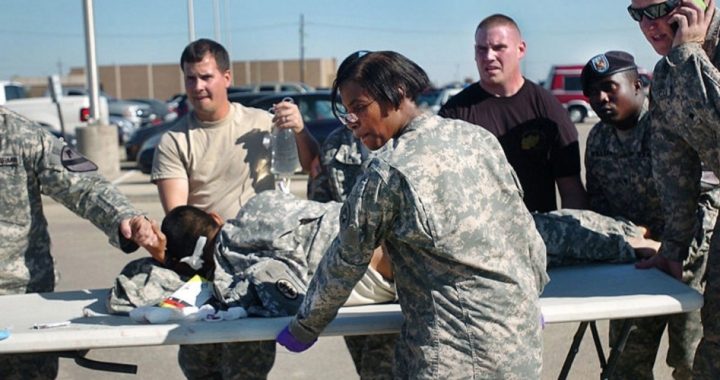
After nearly four years of delays, the military trial of Nidal Malik Hasan, the accused Fort Hood shooter, begins today with Hasan representing himself against charges of 13 counts of premeditated murder and another 32 counts of attempted murder stemming from the attack on November 5, 2009. The costs of trying Hasan, estimated to be $5 million and counting, are compounded by the frustrations of many over the four years of delays, stalling tactics, and unexplained dithering by judges and Army officials. In addition, the Army considers the shooting to have been an incident of “workplace violence,” rather than a terrorist attack, denying benefits to the shooter’s victims that would otherwise have been paid. To top it off, Hasan has been living like a king at taxpayers’ expense while waiting for his trial to begin.
That he is guilty is not even contested by Hasan himself. He asked to plead guilty but was denied under Army rules because a court-martial conviction would require either a death sentence or life in prison without parole and such a plea-bargain would violate court-martial rules.
It was premeditated murder. He knew exactly what he was doing.
On July 31, 2009, he visited the Guns Galore shop in Killeen, Texas, and asked specifically for “the most technologically advanced weapon on the market and the one with the highest standard magazine capacity.” Based on recommendations by the store manager, he returned home to research the suggested firearm on the Internet and returned to the store the next day to make his purchase: an FN Five-seven pistol, with a standard 20-round magazine. He returned to the store on a weekly basis to purchase additional magazines and ammunition. He went to an outdoor shooting range to work on his marksmanship skills, which after a time allowed him to hit man-size silhouette targets at distances of up to 100 yards.
At 1:30 p.m. on Thursday, November 5, Hasan entered Fort Hood’s Soldier Readiness Processing Center, took a seat, bowed his head in prayer for several seconds, and then jumped up, shouted “Allahu Akbar!” (God is Great) and began picking off his fellow soldiers one by one. He had time to reload his gun when his magazine ran empty, as none of his victims was armed, and was able to fend off three separate attempts to neutralize him before he was finally subdued by a local police officer. The rampage lasted 10 minutes. Hasan was shot four times, with two rounds severing his spinal cord, rendering him a paraplegic. There was so much blood flowing from the victims that rescuers couldn’t gain traction on the slippery floors.
Once Hasan recovered from his wounds and was be able to care for himself, he was moved from the Brooke Army Medical Center to the Bell County jail 20 miles away in Helton, Texas, in April 2010, under a contract with the Army. And then the delaying game began.
In October 2010, Hasan was due to appear at a military hearing, formally called an Article 32 proceeding, which was expected to last from four to six weeks. But the hearing was delayed by “scheduling and procedural disputes.” In what turned out to be a vast understatement, Col. James Pohl, a military judge serving as the hearing’s investigative officer, said: “We’ve got to protect everybody’s rights. We’re not operating on a time limit or clock.”
On November 15 the hearing ended, and on November 18, Pohl recommended that Hasan be court-martialed and face the death penalty. His recommendation was forwarded to another Colonel who, after adding his own report, presented it to the post commander. Eight months later, the post commander referred the case to a court-martial. On July 27, 2011, the Fort Hood chief circuit judge set a March 2012 trial date, 16 months from the date of the shooting.
In February 2012, his court-martial was pushed back to June as a “matter of necessity of adequate time for pretrial preparation.” In April, Hasan’s lawyers requested another continuance to October. The judge pushed back the trial to August instead.
That date was delayed because of Hasan’s objections to having his beard shaved against his will and his appeal over the matter to the U.S. Court of Appeals. No date for his trial was set until all of Hasan’s appeals had been heard.
In June 2013, Hasan asked the court for permission to represent himself, and the trial began on Tuesday, August 6, 2013.
In the meantime, Hasan has been royally cared for at taxpayers’ expense. For security reasons, Hasan is ferried by Army helicopter from his jail cell to Fort Hood and back, along with an additional helicopter, as riding by car was deemed too dangerous to the defendant. The Army told NBC that such rides are necessary “because the jail does not have the proper facilities for Hasan to work on his legal defense.” In addition, Hasan is considered such a security risk that the Bell County Sheriff provides a special guard for Hasan for at least 12 hours every day. When he arrives at Fort Hood he is placed in a special trailer that has been modified to accommodate his wheelchair and provided other amenities.
Hasan continues to receive his Major’s pay, as Army rules don’t permit cessation unless and until he is convicted of a crime. So far, Hasan has received nearly $300,000 since the shooting. And this doesn’t count his medical expenses which continue to be paid by the Army.
The cost of Hasan’s jail cell in Bell County has been shifted from local taxpayers to America’s taxpayers, courtesy of the U.S. Army. The contract, so far, has cost the U.S. Army more than $500,000 since the shooting, most of it for security.
At his trial, Hasan is expected to use a “defense of others” strategy, claiming that he was protecting his Muslim brothers in Afghanistan from attacks by American soldiers. The court is allowing Hasan to confront his victims as part of his defense. This is outraging one of those expected to be cross-examined by Hasan: Staff Sergeant Alonzo Lunsford, who was shot seven times by Hasan. Lunsford said it’s going to be “a battle of wits, and he’s going to lose. I was there. I saw what this man did. I’m living proof of what he did.… I’m not going to show any fear.”
Such a “defense” of an indefensible act doesn’t carry any water for Jeff Addicott, director of the Center for Terrorism Law at St. Mary’s University in San Antonio, Texas: “Even if [Hasan] feels the U.S. is in an unjustified war, [he] isn’t going to be able to show a threat is immediate because these soldiers were on U.S. soil and unarmed.” Furthermore, the use of such a defense will “make a mockery of the judicial system,” according to Reed Rubinstein, the lawyer representing Fort Hood victims in their lawsuit against the government.
Hasan has already successfully made a mockery of the military legal system. Assuming that the trial ends in a conviction, the now-skilled master at delay and dithering and manipulation will no doubt continue to drag out his case for years.
A graduate of Cornell University and a former investment advisor, Bob is a regular contributor to The New American magazine and blogs frequently at www.LightFromTheRight.com, primarily on economics and politics. He can be reached at [email protected].



